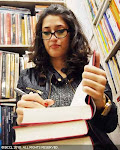
Join us to Seek Justice for Mir Murtaza Bhutto
Thursday, February 23, 2012
Saturday, February 11, 2012
The Diary: Fatima Bhutto
Wednesday, February 1, 2012
The Jaipur Quit Fest
The Jaipur Literature Festival — which has grown from a modest literary gathering to one of the world's most star-studded literary extravaganzas — was mired in controversy last week. Its organizers hoped to solidify its position as one of the world's premiere literary destinations by having Oprah Winfrey, among others, as a special guest. But Oprah's attendance was overshadowed by the events surrounding Salman Rushdie, who was forced to cancel his appearance at the Jaipur Lit Fest, as it is often called, when issues of his own safety were raised by police reports suggesting a gang from the Bombay underworld were coming to kill him.
The gangsters were thought to have been empowered by the protests against Rushdie's visit from students of the nearby Darul Uloom Deoband Islamic seminary which had asked the government to not grant the author a visa (incidentally, he didn't need one) as he had allegedly hurt religious sentiments of Muslims with his 1988 novel The Satanic Verses. (In the end the gangsters, it seemed, were a figment of two Rajastani police officers' imagination, who, by choosing the path of least resistance, concocted the story into to frighten Rushdie into not coming.)
Further controversy followed when writers, wanting to express solidarity with Rushdie by reading from The Satanic Verses, were stopped doing so by festival organizers. One of those readers was Ruchir Joshi who has written a thoughtful, candid and angryaccount of his experience at the festival. Joshi suggested that the festival's organizers "were merely keen to get us troublemakers off the premises." Hari Kunzru and Amitava Kumar have also written accounts of their experience. (Lit fest organizers William Dalyrmple and Sanjoy Roy defend their actions here and here.)
The integrity of the festival — now reckoned to draw 50,000 people — and its long line of corporate sponsors, seemed to some observers of greater priority than both the principle of free expression and the defense of a writer and his book from angry people who in every likelihood have never read Rushdie's novel.
Oprah was also overshadowed by the appearance of Nation Books author Fatima Bhutto, whose discussion on Pakistan with historian and sociologist Ayesha Jalal drew as many, if not more, attendees than Oprah. (Watch the panel, moderated by Karan Thapar, with a cow in an adjacent lot mooing in chorus.)
But it was a panel moderated by Bhutto, "Writing and Resistance," that offered a poignant reminder of what a literary festival — beyond celebrity, beyond gossip, beyond self-congratulation — can and should do. It featured the Palestinian writer Raja Shehadeh, Burmese writer Thant Myint-U, and the Kashmiri journalist Iftikhar Gilani — all writers who have in one way or another confronted the brutality of state power — and explored the relationship between writing and activism.
Bhutto began the discussion by invoking these imperishable lines from Ryszard Kapuściński's 1982 book, Shah of Shahs:
All books about all revolutions begin with a chapter that describes the decay of tottering authority or the misery and sufferings of the people. They should begin with a psychological chapter, one that shows how a harassed, terrified man suddenly breaks his terror, stops being afraid. This unusual process, sometimes accomplished in an instant like a shock or a lustration, demands illuminating. Man gets rid of fear and feels free. Without that there would be no revolution.
Bhutto asked her panelists: Is that harassed man a constant in your writing?
The discussion that followed circled back to this question. It also examined these questions: Why is writing regarded as secondary to physical resistance? What kind of fraternity can exist between writers and the space of resistance? What is the role of a writer in a resistance movement (both Gilani and Shehadeh suggested that resistance movements without intellectual guidance can descend in to chaos).
At one moment Bhutto recounted Gilani's experience of having books by EM Forster confiscated by the Indian security forces and then paused and asked the panel, "What is so dangerous about books?" to which Gilani replied, "The danger is never in the book, only in the mind of the security people."
When asked about the similarities between resistance struggles across the world, Shehadeh suggested that it was a privilege for a writer to be involved in struggle because that experience allowed one to emphasize with struggle and suffering elsewhere.
A serious subject for discussion, but the mood was lightened by Gilani's witty accounts of cricket games played inside the Indian jail where he spent eight months in 2002 and his suggestion that all writers, perhaps, should spend some time in prison.





